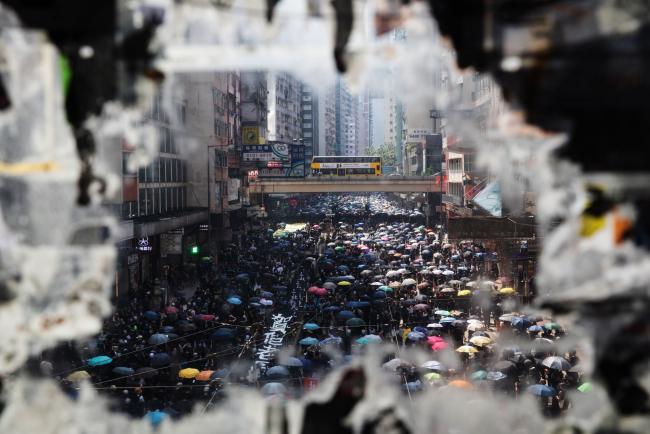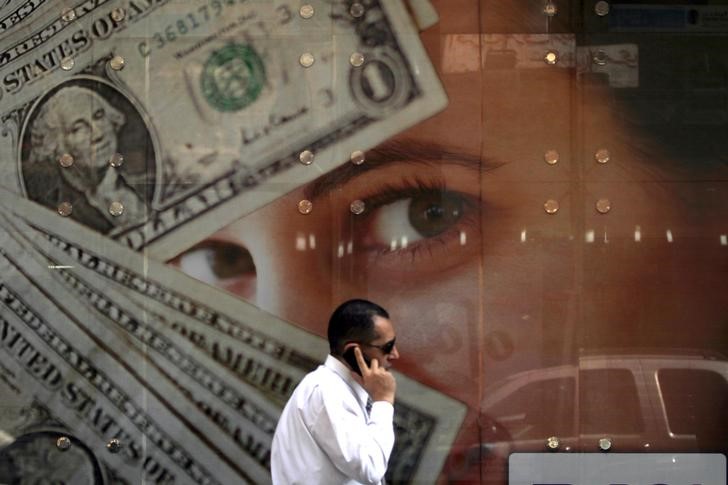(Bloomberg) -- Under the United States-Hong Kong Policy Act of 1992, the U.S. treated Hong Kong, a semi-autonomous part of China with its own legal and economic system, differently than the Chinese mainland in trade, commerce and other areas. President Donald Trump, punishing China for moves to tighten its grip on the city after a year of pro-democracy street protests, says Hong Kong’s special status is now a thing of the past. At its most extreme, that could mean the global financial hub is treated the same as any other Chinese city -- a seismic shift that could harm both economies at an already difficult time.
1. What did Trump do?
He announced on July 14 that he had signed an executive order ending Hong Kong’s special status. His administration had telegraphed the move for weeks. On May 27, Secretary of State Michael Pompeo notified Congress that the White House no longer regarded Hong Kong as autonomous from mainland China. On June 29, Commerce Secretary Wilbur Ross said that meant the special status had been revoked.
2. What’s the impact?
In the short term, the White House said that holders of Hong Kong passports will lose some special privileges -- until now, they’ve been exempt from certain requirements on mainland Chinese who travel to the U.S. He also said Hong Kong will lose some benefits related to U.S. exports. But Trump offered no specifics about the broader impact of his order, including what it means for tariffs and for Hong Kong’s financial industry. Earlier, Pompeo had announced visa restrictions against unspecified Chinese officials and said the U.S. would cease selling defense equipment to Hong Kong, a largely symbolic act that will mostly affect the city’s police and corrections forces. In deciding how far to go, Trump has to weigh consequences for the U.S. economy, including the U.S.-China trade deal that Trump had considered one of his biggest achievements and which could affect his odds of winning re-election.
3. What’s at stake for Hong Kong and China?
While Hong Kong remains a gateway from China to the rest of the world, it matters far less to the mainland’s fortunes than it once did. In 2019, 12% of China’s exports went to or through Hong Kong, down from 45% in 1992. China is also far less reliant on inflows of foreign capital and expertise, and made a lower priority of making the yuan an international currency -- although it has renewed the push as tensions with the U.S. have risen. Regardless, the city still matters. Hong Kong’s open capital account and adherence to international standards of governance are unmatched by any mainland Chinese city and make it an important base for international banks and trading firms. A revocation of its special status would mark “the beginning of the death of Hong Kong as we know it,” Steve Tsang, director of the University of London’s SOAS China Institute, said last year.
4. And their financial markets?
If the U.S. treats Hong Kong no differently than any other Chinese city, would ratings firms and investors do the same? That’s a question posed by Deutsche Bank (DE:DBKGn), which noted that S&P Global Ratings has Hong Kong three notches above China while Moody’s and Fitch have Hong Kong one notch higher. The risk is that China’s own rating gets lowered in coming years and drags Hong Kong’s down with it. At the same time, equity index providers may take a fresh look at Hong Kong, which is currently in the MSCI World Index with other developed markets. China is in the emerging market index, raising the question, should Hong Kong be treated the same as Shanghai and Shenzhen?
5. What’s at stake for the U.S.?
It has its own reasons for not rocking the boat too much. Hong Kong, the only semi-democratic jurisdiction under Chinese rule, offers U.S. companies a relatively safe way to access the Chinese market and employs a U.S. dollar peg, linking it with the American financial system. According to the Congressional Research Service, the largest U.S. trade surplus in 2019 was with Hong Kong — $36 billion. Hong Kong counted 278 U.S. companies with regional headquarters in the city that year and another 457 with offices. Hong Kong’s first justice minister after the handover to China in 1997, Elsie Leung, told the South China Morning Post in May that any damage would be mutual: “We are not just getting the benefits – it’s a free-trade arrangement which is good for both sides.”
6. How has China responded?
The Foreign Ministry has promised unspecified retaliation against what it terms foreign interference, insisting Hong Kong is purely an internal affair. China said last year it would sanction some U.S.-based activist groups including the National Endowment for Democracy, Human Rights Watch and Freedom House, and suspend port visits by U.S. Navy ships to Hong Kong. The official Xinhua News Agency has dismissed as “groundless” accusations about the loss of freedom or human rights issues in Hong Kong. It also noted that the 2018 Human Freedom Index compiled by the Fraser Institute, a Vancouver-based think tank, ranked Hong Kong at No. 3, well ahead of the U.S. at No. 17.
7. And Hong Kong?
The city’s leader, Chief Executive Carrie Lam, has said it’s “totally unacceptable” for foreign legislatures to interfere in Hong Kong’s internal affairs, and that sanctions would only complicate the city’s problems. (Lam was selected in 2017 by a committee of 1,200 political insiders overwhelmingly loyal to the Chinese government.) She has sought to reassure investors that the city still adheres to the rule of law and has an independent judiciary. She also has defended police actions.
8. Is this what the pro-democracy protesters have been seeking?
As a largely leaderless movement, the Hong Kong protests have made no official request for international assistance. But some prominent activists including Jimmy Lai and Joshua Wong called on Trump to hit China hard with sanctions. Wong had testified last year in Washington in favor of putting pressure on China. On the streets of Hong Kong, some protesters have made clear their interest in U.S. support by waving American flags, singing “The Star-Spangled Banner” and calling on Trump to “liberate” Hong Kong. Such rallying cries are now illegal in Hong Kong under the new national security law.
©2020 Bloomberg L.P.

